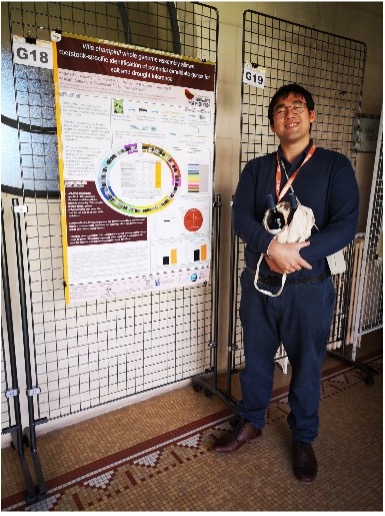Terroir and climate are major drivers of wine quality. In addition, climate can be an important component of terroir. Terroir is a complex concept and climate change is currently challenging our understanding of its relationship with wine quality and marketing.
Terclim2022, held in Bordeaux from the 3 to 8 July 2022, brought together scientists from all over the world working on viticultural terroirs as well as climate change impacts and adaptation strategies. Waite was well-represented, with several researchers in attendance including A/Prof Cassandra Collins, A/Prof Sue Bastian, Dr Lira Souza Gonzaga, A/Lecturer Benjamin Pike, and Andres Zhou Tsang from the University of Adelaide, as well as Dr Rob. Bramley from CSIRO.
Andres is a PhD Candidate, based in the ARC Training Centre for Innovative Wine Production and Plant Transport & Signalling Group. His research focuses on the adaptative mechanisms of grapevines and rootstocks to salinity, and their genetic and genomic basis. Andres was recently involved in documenting the whole genome for Ramsey (Vitis champinii), a vigorous grapevine rootstock with excellent drought and salt tolerance – sitting among the most planted in Australia and overseas. He will be sharing his experience at Terclim2022, where he presented a poster discussing implementation of the whole genome assembly of Ramsey to guide analyses of the cultivar’s gene expression under drought and salinity. This approach led to the identification of a group of genes expressed in Ramsey which are not found in the classic grapevine reference genome. This group of genes could be helpful to find markers for the rootstock’s distinct traits such as salt tolerance – providing a useful tool for the development of new rootstock varieties that are more resistant to the effects of climate change.
Andres was awarded the prize for “Best poster made by a young scientist”. Congratulations to Andres, his supervisory team and other collaborators on this well-earned achievement!

Andres with his poster, holding bottles of wine awarded for the poster.
Despite over 20 hours of travel, Andres arrived in Bordeaux full of energy. He felt immersed in the enthusiasm of the environment where the participants, most having travelled from across the world, were eager to re-connect after several years apart. Andres was particularly excited by the opportunity to learn from experts in several different fields and discuss emerging areas of grape and wine research, such as alternative grape varieties.
“I was absolutely fascinated by the amount and diversity of innovative grape and wine research that has been brought to the conference. The conference program developed around the topics of climate and soil influences in grapevines, viticultural practices and novel technologies, grapevine diversity, sustainability and climate change, and the influences of all these factors in the characteristics of wine…I was particularly impressed by the extended interest in exploring alternative grape varieties for adaptation to climate change, not only from research groups but also producers and appellations of origin.”
Other highlights included presentations from fellow Waite researchers, summarised below (and pictured on Twitter).
- A/Prof Cassandra Collins presenting her team’s research on the assessment of fire damage in vineyards using satellite imaging, as well as research completed with her PhD student, Merek Kesser, on under-vine management and its effects on grapevine production, soil properties and plant communities.
- A/Prof Sue Bastian chairing a session on the impact of terroir and climate change on wine quality and typicity.
- Postdoctoral researcher and Lecturer, Dr. Lira Souza Gonzaga presenting her research on the chemical characteristics and sensory profiles of Shiraz wines across areas of the Barossa.
- A/Lecturer Benjamin Pike presenting his research on biomass management in vineyards.
- CSIRO team leader Dr. Rob Bramley presenting his team’s research on multiple zonal variation of soil and environment within the same wine region.
Of course, the conference also provided the perfect opportunity for attendees to explore the historic wine regions of the area: Saint-Emillion, Haut-Medoc and Sauternes. The conference arranged visits to several vineyards and wineries, where attendees learnt about the distinct soil properties of each region through clear demonstrations with soil pits excavated in the vineyards. Andres shared, “the grapegrowers and winemakers at each stop provided detailed explanations on their climatic conditions and how these shape their viticultural and winemaking decisions, together with the tour guides who also shared their research on the terroir of these vineyards. We tasted a broad selection of their wines both on field and during the gala dinners!”
Congratulations to all presenters, and thank you Andres for sharing your experience.
Read the full Terclim2022 scientific program here.

